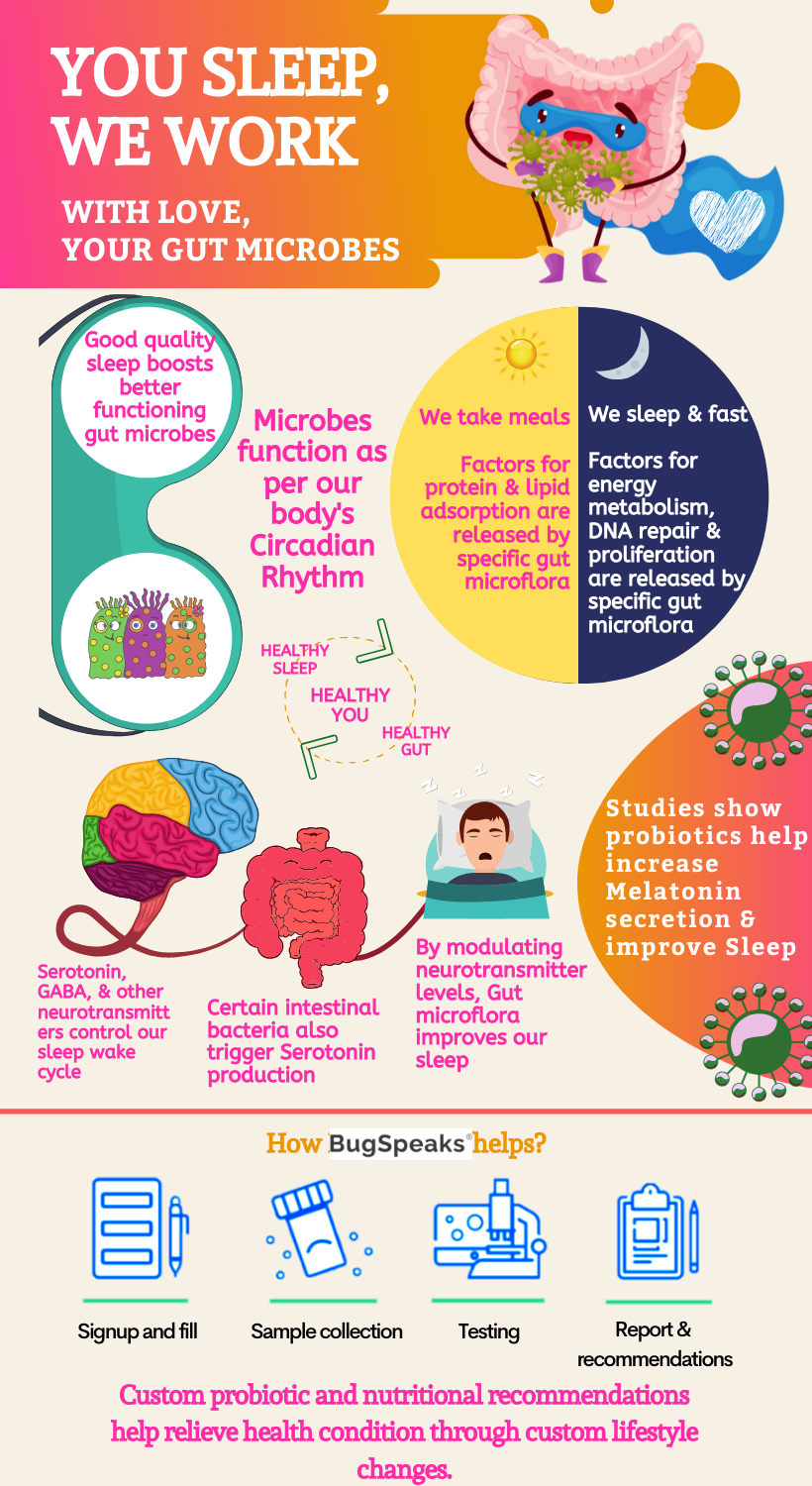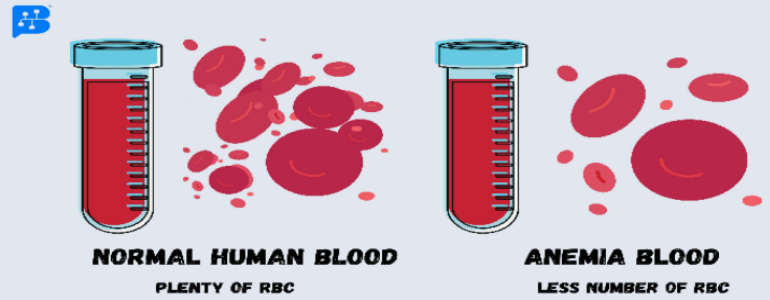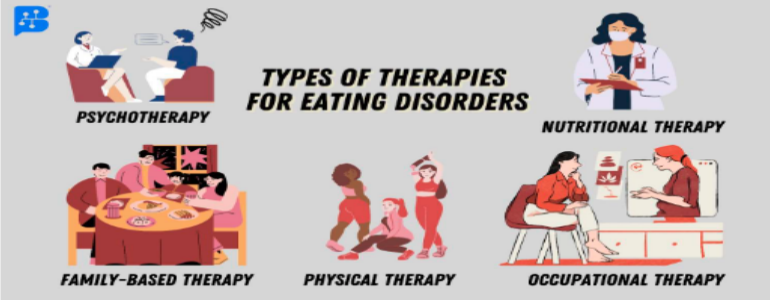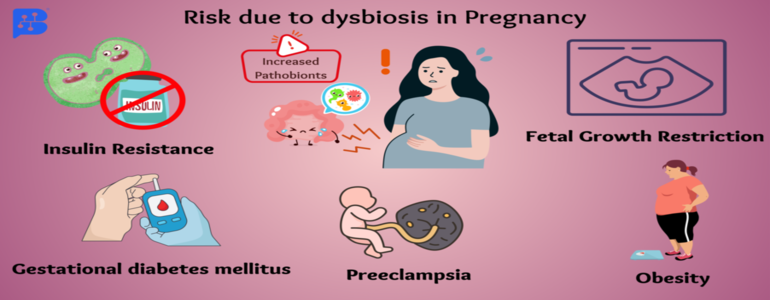- Dec. 5, 2019
- BugSpeaks
- Microbiome and Lifestyle
Sound gut for Sound Sleep
Almost all of us have experienced sleeplessness some time in our life. Occasional sleep disruption is quite reasonable. However, it’s reasonably problematic to have a sleep problem regularly. Lack of good night sleep daily can restrict your everyday activities. It may seriously affect your quality of life through an adverse impact on mood, work efficiency, stress handling, and others.
According to Mayo Clinic, ‘A sleep disorder or insomnia is a condition that frequently impacts your ability to get enough good quality sleep’. It can arise from all sorts of stresses in your life, disrupted sleep-wake cycles, including jet lag, frequent change in work shifts, and poor lifestyle, like having a heavy meal or alcohol in the late evening or watching television till night. Insomnia often finds an association with medical conditions like mental health disorders, or use of medications like antidepressants, asthma or blood pressure, or products containing caffeine.
You would be quite surprised to know that disrupted sleep is often associated with poor gut microbial health!
Sleeping for a healthy gut microbiome
Trillions of micro-organisms inhabit your gut remains a known fact. They outnumber the total of the cells in your body by at-least ten times. These micro-organisms form an ecosystem of their own and known as the microbiome. The various kinds of intestinal micro-organisms display a dynamic equilibrium in a healthy individual. This subtle balance is vital for health, and a slight imbalance increases the host’s vulnerability to disease.
It's quite apparent that diet would have the most significant influence on your gastro-intestinal tract and the micro-organisms residing in there. However, a recent review conducted by Dr. James F. Cheeseman from the University of Auckland, New Zealand, established that not only the food we consume but also the sleep patterns are also connected to our gut microbiome.
The researchers have observed that gut microbiome plays a significant role in circadian clock function along with other phenotypic characteristics, like, immunity, metabolism, and others. The circadian rhythm is our inner clock, which controls our body’s energy disbursement, hunger, and snooze. We usually get about seven hours of sound sleep every night. In the morning, when we wake up, our body warms up to carry out daily chores. To run our body, we need energy, and energy comes from the food we eat during the day. At night, our body needs rest to rewind, so we fast and go to sleep.
Gut microbiome resonates with the bodily rhythm
The scientific world now accepts the robust connection between sleep and intestinal wellbeing. A good quality night sleep allows more flourishing and better functioning gut microbiome and vice versa.
Researchers report the reflection of our body’s underlying rhythmicity in the intestinal flora too. For example, Firmicutes sp. remains overpopulated during the daytime when we have frequent meals. While, the number of some gut flora such as Bacteroidetes sp., Proteobacteria sp., and Verrucomicrobia sp. increases during the night when we sleep and fast. Generally, the microbes which grow on food derived fibres grow at night, as what we consume during the day reaches the colon by night time.
Gut flora follows the rhythm by secreting specific molecules at certain times of the day. At night, secretion of factors responsible for energy metabolism, DNA repair, and proliferation occurs. During day-time, flora harbouring in the gut releases molecules essential for their colonization.
As in circadian rhythm, we fast and sleep during the night. It is advantageous to maintain a healthy gut microbiome. During fasting the Bifidobacteria sp., Ruminococcus bromii and Clostridium chartatabidum, produce short-chain fatty acids, including, butyrate, and propionate. Butyrate protects our gut and regulates glucose levels by a complex network of metabolites and various hormones. Propionate plays a crucial role in fat metabolism in liver. The scenario is entirely different at mealtimes, where the release of factors helpful for lipid and protein adsorption occurs.

Gut microbiome, sleep, and hormones
Neurotransmitters like serotonin and GABA secreted by brain control our sleep-wake cycle. Astoundingly, certain intestinal bacteria including, Turicibacter sanguinis and Clostridia sp., release specific signalling molecules that trigger the production of serotonin. By modulating serotonin levels, the gut microbiome can interfere or improve our sleep pattern. Melatonin, the sleep hormone generated from serotonin, helps to improve our sleep.
Interesting enough, studies have shown that ingesting probiotics may help increase melatonin secretion and sleeping quality, opening an avenue for the future use of probiotics for sleep regulation, gut health, and overall well-being16. Alteration in the gut flora often can induce inflammation in the body, which may lead to sleep deprivation as well. It leads to a vicious cycle of sleep deprivation, which can exert an adverse influence on the well-being of gut microbiome and vice-versa.
Thus, ignoring sleep problems and disorders can end up badly for your physical health. Stress and anxiety due to sleep deprivation can lead to accidents, poor performance at work, and memory-related issues. Poor gut health due to lack of sleep can also lead to excessive weight gain, which plays a central role in many life-threatening diseases.
Testing little gut microbes for healthy sleep
By now, you may have a clear picture in your mind showing the entangled relation of the health of your gut microbiome and sleep. So, to resolve sleep disorders, common sleeping pills or CPAP machines will not help. To cure it of its root, all you need is to get a ‘Gut Microbiome Test’ done. ‘Gut Microbiome Test’ uses sophisticated ‘DNA sequencing technology’ inpatient stool samples to identify the exclusive collection of micro-organisms existing in your gut. Then this data is used to provide a diet plan exclusively for you, comprising of gut-friendly, plant-based, and fibre-rich food with no added sugar. You will also be advised to have a lifestyle supporting your body clock, like regularly having a meal at least a couple of hours before going to bed, and strictly restricting snacks/ light meals before going to bed.
Therefore, this plan aimed to rectify your sleep issues by improving your gut microbiome.








